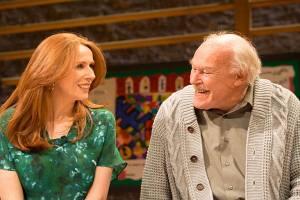The Vote
Television reviews are usually published post-transmission, so they are effectively a guide to what you've missed (but may be able to retrieve later now in the world of catch-up iPlayers). Theatre used to end after the curtain came down (but now with live broadcasts of plays from the National being recorded and Encore screenings taking place, that's no longer true, either). We are living in changing times.
And now TV and theatre come together an event that's a reminder of the one-time practice of performing TV drama - often in front of a studio audience - and transmitting it simultaneously live. So part of The Vote is going backwards in time, but the constant it portrays is also unchanging: the ancient exercise of our democracy when we go into school and village halls across the country to cast our votes on a ballot paper, marking them with a pencil, in a private booth.
James Graham's new play, after his more searching and challenging This House (at the National in 2012) and Privacy (at the Donmar Warehouse in 2014), is set in the here and now of the last 90 minutes of the action (and inaction) at a London polling station on election day, and is being broadcast to the nation at exactly that time on More4 on May 7 live from the Donmar. But if you're hoping for a penetrating, topical account of the state of politics today, you're not going to get it here. Instead, it's an affectionate, messy, enjoyable portrait of the human traffic of those that are manning the polling station and those that are coming to vote there, as well as a couple of candidates (a black Conservative who doesn't a chance in this marginal seat where loyalties are divided between Labour and Lib-Dem) and an independent campaigning on one agenda only to change the one-system around Morrison's (the hilarious, show-stealing Paul Chahidi).
Josie Rourke's production, set in an atmospheric recreation of a school gym by designer Robert Jones, is populated by a vast 40-something cast, including such theatrical luminaries as Judi Dench (only seen briefly towards the end), with her real-life daughter Finty Williams, playing mother and daughter who have come to vote (but discover that only one of them is actually registered to do so).
The core players, however, are the poll station staff, including Mark Gatiss as returning officer, Catherine Tate and Nina Sosanya as poll clerks, and Gerard Horan as the school caretaker. There isn't much time to get to know any of them, though, in the midst of the mini-crisis that occurs when it is discovered that Timothy West's pensioner Fred may have cast his vote twice over.
This feels a bit like an Ayckbourn play crossed with a little bit of Ray Cooney, but neither the rich human or farcical potential is ever realised that either might have brought to it. Nevertheless, a highly affectionate production by Rourke drives the play forward, meticulously timed against a clock that counts down the minutes to the closing of the polls, and its fun ticking off the regular London theatre faces, including Bill Paterson, Jackie Clune, Hadley Fraser, Rosalie Craig, Michael Shaeffer and Stephen Kennedy as they pass through the room.
"It's hard amid such a diverse melee and incredible team effort to single anyone out but hilarious Paul Chahidi almost steals the show as an independent candidate beadily obsessed with scrapping a one-way system."
Dominic Cavendish for The Daily Telegraph
"With so many famous names in the cast, Rourke's production occasionally feels like a charity gala."
Michael Billington for The Guardian
External links to full reviews from popular press
Telegraph - Guardian
Originally published on
